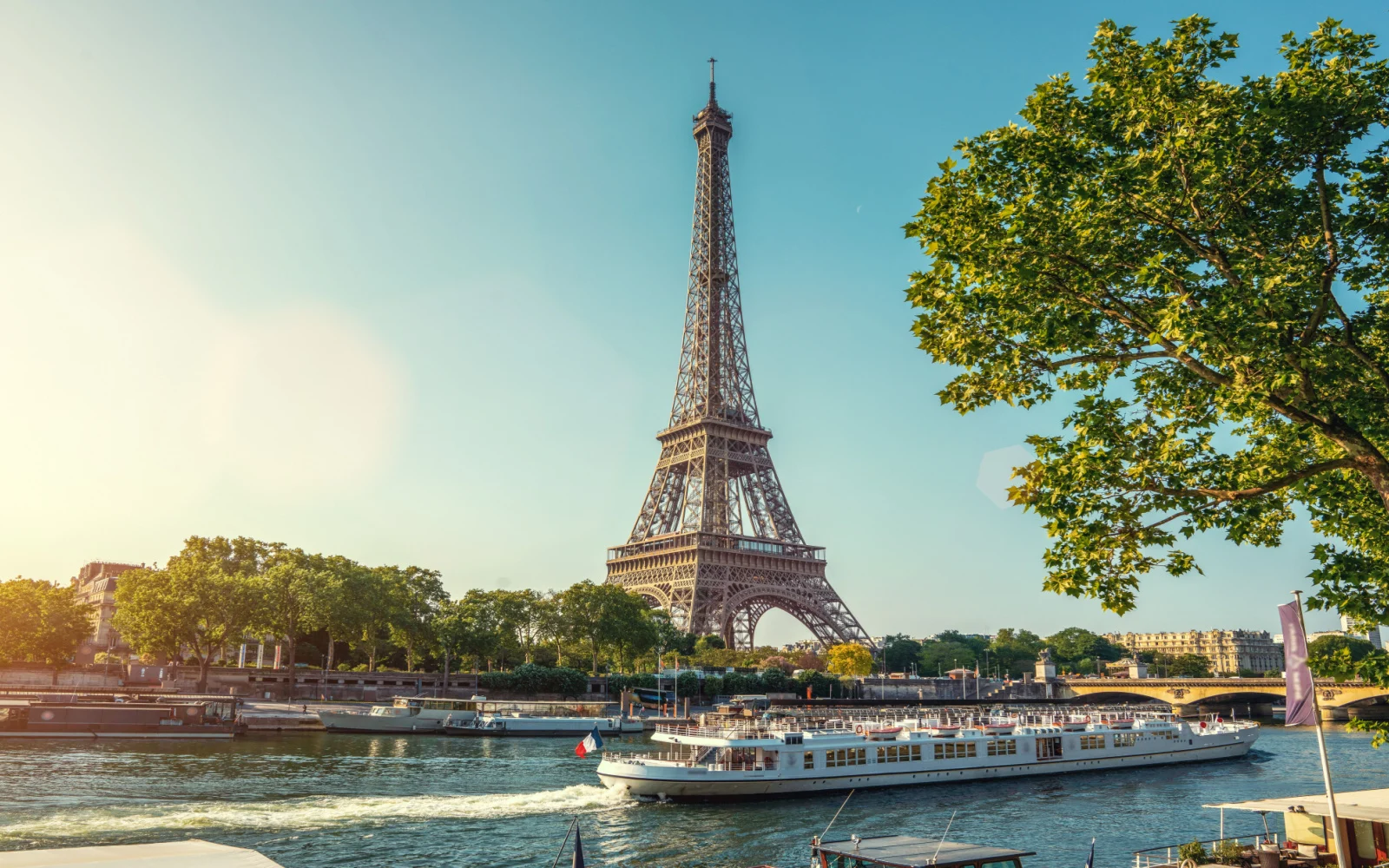France is a famous country located in Western Europe. Within its borders, you can find medieval cities, breathtaking scenery, alpine villages, rustic towns, modern cities, and Mediterranean beaches.
Paris, its capital, is home to the famous Eiffel Tower as well as some of the best food, drink, and shopping experiences in the country.
France is also renowned for the Lascaux’s ancient cave drawings, Lyon’s Roman theatre, and the sprawling Palace of Versailles. Of all the places known in Europe for its rich history, France certainly belongs at the top of the list.
25 Fun Facts About France
Whether you are planning your dream trip to this storied country or are just interested in learning more about this intriguing European country, we have you covered.
Here are 25 fun and interesting facts you might not have known about France, its people, and its history!
1. It is the most visited place in the world.
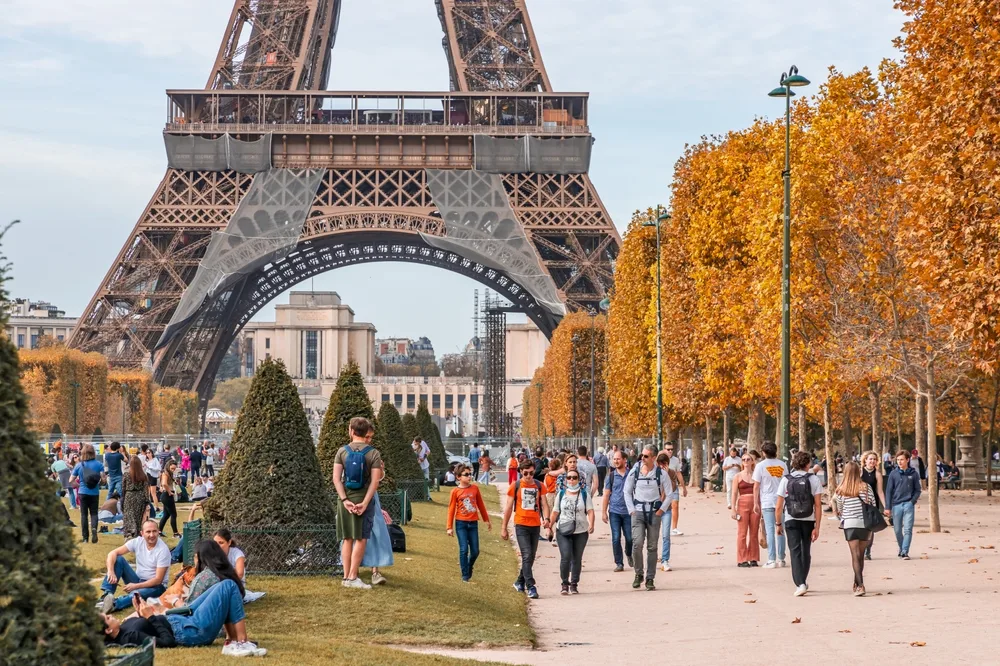
Paris, France – October 2022 : Tourists walking on the Champ de Mars with the Eiffel tower on the background in Autumn in Paris, France/JeanLucIchard/Shutterstock
France proudly holds the record as the most popular tourist destination worldwide. The country sees nearly 90 million visitors annually.
In second place is Spain with around 82 million visitors, and the USA generally ranks third with 78 million. Food, attractions, and scenery are some of the main reasons people come to France.
2. France is known as L’Hexagone.
The French affectionately use the name “L’Hexagone” (“the hexagon”) to refer to their homeland. The name comes from the geometrical shape of the mainland of France.
3. The Tour de France is older than you might think.
Often considered one of the most prestigious cycling races, the Tour de France was first held in 1903. It has run every year other than during WWI and WWII. In 2020, the race was delayed due to COVID-19 concerns but was still held that year all the same.
4. The camera phone was invented in France.
In 1997 an enterprising Paris-born inventor named Philippe Kahn invented the camera phone’s first known prototype. The first photo he snapped was of his newborn daughter, Sophie, and he sent it to friends and relatives.
5. France made same-sex marriage legal in 2013.
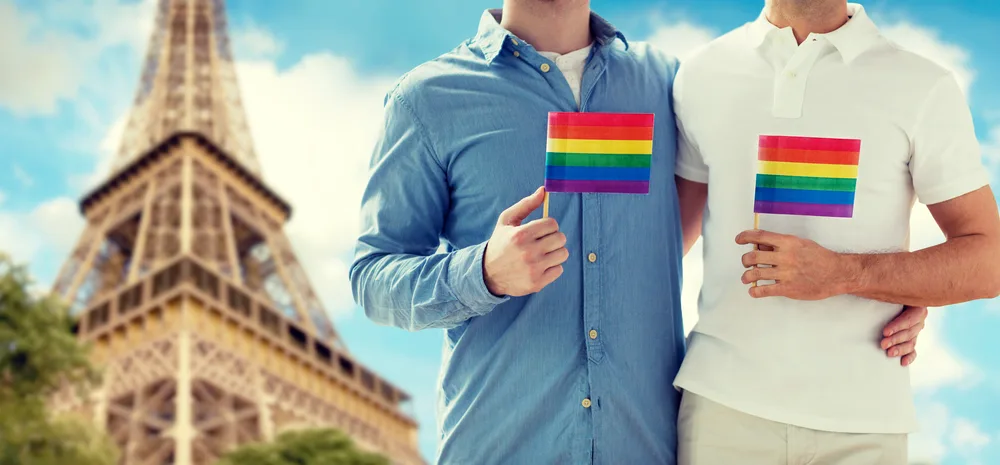
Ground Picture/Shutterstock
President Françoise Holland passed the bill on 18 May 2013, making France the 9th country in Europe and 14th in the world to legalize same-sex marriage.
Polls at the time showed 50% of French people supported it, but there were still many protests throughout the country when the bill passed.
6. The national motto is – Liberte, Egalite, Fraternite
Liberte, Egalite, Franernite translates to “Liberty, Equality and Fratenity” It is believed to have its roots in the French Revolution, but it wasn’t until the late 19th century it became widely used.
7. France has Nobel Prizes for literature.
French writer Sully Prudhomme received the first-ever Nobel Prize for Literature in 1903. France-born writers have received the prestigious award another fourteen times.
8. The Louvre in Paris is very popular.
In fact, every year it ranks as the most visited art museum in the world. Tickets must be bought in advance to control crowds and to protect exhibits. Mullions of people walk through the museum each and every year.
9. The French coastline stretches for 3,427 km.
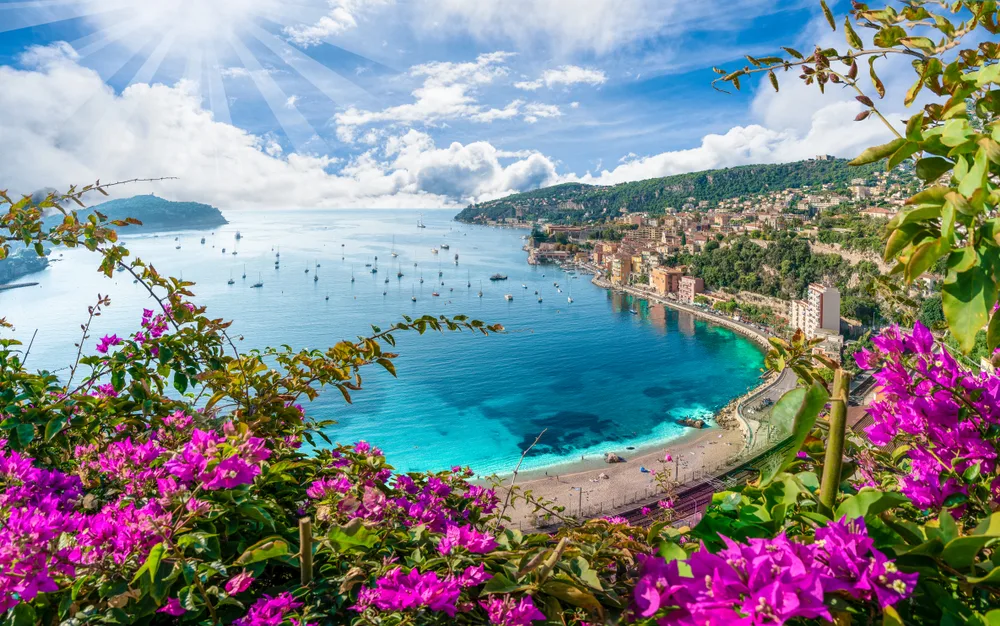
Serenity-H/Shutterstock
The coastline of France covers everything from rocky alcoves to sandy beaches to bustling ports. No matter what you are looking for, if it involves the coastline you are likely to find what you are looking for!
10. France is the largest country in the EU.
France’s landmass is an impressive 547,000 square kilometres, When compared against all European countries, France follows up in third place, behind Ukraine and of course, Russia, which is massive by comparison.
11. New cookbooks are always being printed.
It is said that two new cookbooks are published in the country every single day. This is not too surprising considering how well-known France is for its stunning cuisine and delicious foods No matter what your cooking style or preference, you can find plenty of cookbooks to meet your needs.
12. It is illegal to throw out food in France.
As of 2016, any unsold but edible food sold at supermarkets and major chain stores cannot be thrown out in the trash. It must be donated rather than thrown away.
This includes donating to local food banks and charity groups or setting up free access tables and bins for people to pick up the food as they wish.
13. There are over 400 types of cheese made in the country.
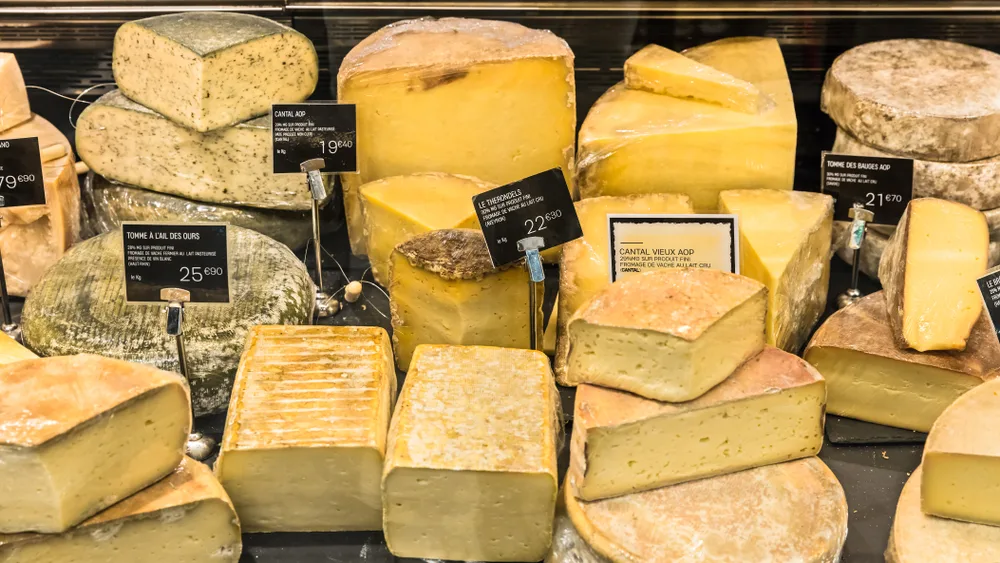
Premier Photo/Shutterstock
The French consume more cheese than anyone else on the planet. It is estimated nearly half the population eats cheese at least once every day.
And that means hundreds of varieties are made right in France with hundreds more being imported from other countries each year. The French especially love pairing cheese with their wine.
14. The French produce buy, sell, and drink a lot of wine.
Speaking of cheese and wine, people in France consume 11.2 billion glasses of wine per year, making up nearly 60% of the country’s total alcohol consumption.
France is also famed as one of the world’s biggest wine producers, with popular names like Champagne, Burgundy and Chablis, being home-grown favorites.
15. One of Europe’s highest mountains is in France.
Standing at a height of 4,807m, Mont Blanc in the French Alps holds the record as the second-highest mountain in Europe. It is a 10 to 12-hour climb to the summit for professionals, or you can enjoy the views during a 20-minute trip up on Europe’s highest cable – Aiguille du Midi.
16. Kilts originated in France, not Scotland.
While kilts have come to be recognised throughout Scotland, similar garments were used around the world, including in early France. Most French kilts were much longer than Scottish kilts, stretching to the ground.
Tartan kilts known in Scotland do originate from the islands though the overall design and style is thought to have been inspired by French dress styles.
17. Louis XIX had the shortest ever reign of a French King.
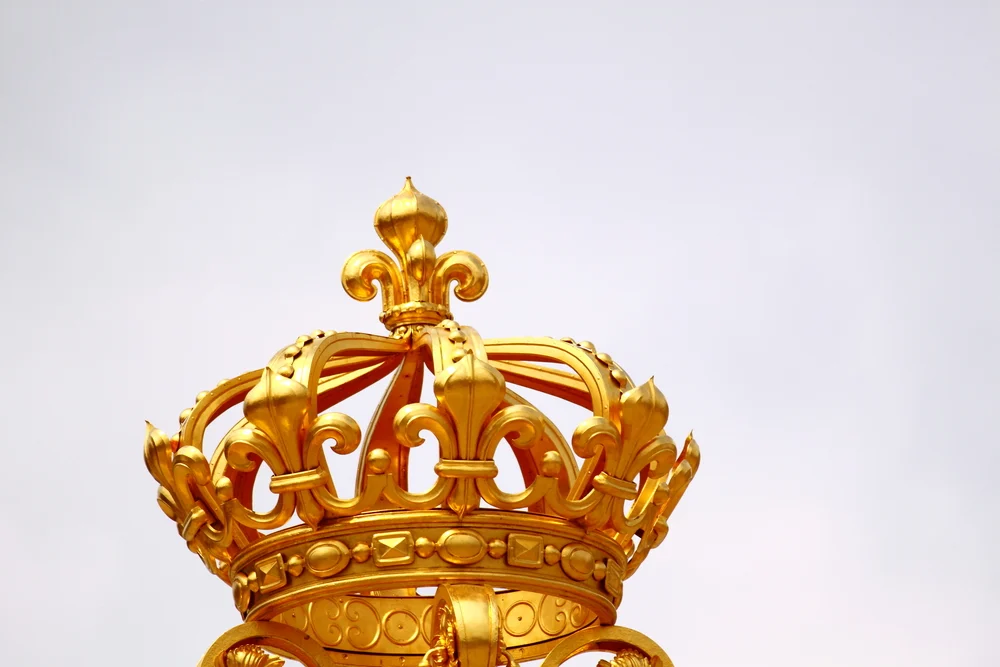
Marco Cannizzaro/Shutterstock
This French king only held his title for 20 minutes after his father Charles X abdicated the throne in July 1830. Louis-Antoine then also abdicated to give the throne to his nephew, the Duke of Bordeaux.
And believe it or not, he shares this astounding record with the Crown Prince Luís Filipe, was in fact King of Portugal after his father was assassinated but only iced 20 minutes before dying himself!
18. The French first used camouflage in 1915 (World War I).
The commonly used word ‘camouflage’ actually is from the French verb meaning ‘to make up for the stage’. The French Army was the first to widely use camouflage as a constant and deliberate fighting tactic.
They even created a dedicated camouflage unit in 1915. Guns and vehicles were painted with unique patterns by artists called camofleurs.
19. The oldest person who ever lived was a French woman.
Her name was Jeanne Louise Calment and she holds the record for the first fully authenticated and verified age to which any human has ever lived – a staggering 122 years and 164 days. Jeanne Louise Calment was born in France on 21 February 1875 and died on 4 August 1997.
20. First artificial heart transplant and face transplant.
The world’s artificial human heart transplant occurred in December 2013 at the Georges Pompidou Hospital in Paris. It used a mechanical heart that mimics the pumping action of the real human heart.
French surgeons also gained worldwide attention when they were able to perform a successful face transplant in 2005.
21. The French eat a lot of snails.

YARUNIV Studio/Shutterstock
It has been estimated that the French eat about 30,000 metric tons of snails (escargot) yearly. And as much as two-thirds of those snails come from Eastern Europe and the Balkans, making snail import a major industry in the country.
22. Paris Gare du Nord is Europe’s busiest railway station.
This bustling hub is the busiest railway station in Europe and only Japan has more visitors worldwide. More than 214 million passengers pass through it each year. The original station was built in 1846 and then was rebuilt in 1889.
Further extensions were carried out between the 1930s and 1960s. The 2024 Olympics are promising more work to be done to accommodate the expected traffic increase.
23. White wedding dresses originated in France in 1499.
This now quintessential wedding tradition actually began with the marriage of Anne of Brittany and Louis XII of France in 1499. She wore a white dress to the wedding for the first time.
But it was in 1840, when Queen Victoria married Prince Albert, that the traditional white wedding dress trend was really cemented in people’s minds.
24. There are regulations in place on French radio stations.
At least 35% of all music played on private radio stations must be French. This means more than a third of what is heard will be in French, and radio stations specializing in foreign music are held to a 15% quota.
25. The French were avid inventors.

vectorfusionart/Shutterstock
French inventor Nicolas Appert invented canning with boiling water in 1809. Pierre Durand later invented the tin can. Braille was also developed by Louis Braille.
The physician René Laennec invented the stethoscope back in 1816 and hot air balloons were invented by the Montgolfier brothers Joseph and Etienne as early as 1783.
Frequently Asked Questions
As the most popular tourist destination in the world, you might be looking to travel to France in the near future. If so, it will pay to be prepared ahead of time. With these common questions and answers in hand, you can be better prepared to make the most of your visit to the country.
Will I need to get a visa for my trip to France?
If you are a US citizen then, no. American citizens are allowed to travel to France for up to 90 days without a visa. Longer stays will need additional documentation and paperwork before your arrival and will have to be approved by the government before you can enter the country.
What’s the best way to get around?
France has an excellent public transportation system. Cities have buses, taxis, and rental car options as well as pedestrian-friendly areas in most places. Even more remote areas can be reached by bus and train or with a rental car.
You can drive to many locations and then explore other areas on foot in relatively safety.
Any tips for staying safe?
France is the most-visited tourist destination in the world. Because of this violent crimes are relatively low but petty crimes like theft and pickpocketing can be high in some areas. Always be aware of your surroundings, use common sense, keep your eye on your possessions, and you will be fine.
Do I need an International driver’s license?
Any driver’s license written in Latin characters can be used for car rentals and driving in France. But if not, then you will need to put in an application for an International driver’s license. If you have a valid American, Canadian or Australian driver’s license, you will be able to drive In France with no other requirements needed.
What side of the road does France drive on?
The French drive on the right side of the road. If you are from a place that drives on the left side then you will need to hire a driver during your stay or give yourself time to adjust to the different driving experience.
Can I drink tap water in France?
In most of the cities there is no concern about driving tap water in France. Some villages may have fountains and water access that is not safe and it will generally be noted as « eau non potable ». If you are concerned, always feel free to ask someone “L’eau est-elle potable?” and they will be happy to assist you.
Is there reliable Wifi in France?
Free Wifi is accessible in all accommodations. More restaurants, museums, and public spaces are offering free Wifi as well. Strength and reliability are generally better in major cities but as internet providers improve so does the access in more remote areas.
Book Your Trip to France Today!
Travelling to France is a dream come true for many people. With plenty to see and do and more than enough to fall in love with from day one, you will love your time exploring this country. Make sure everything is taken care of for you before you head off on your dream trip.
Find the best accommodations and deals available right now. With so much to see and do, what are you waiting for – book your trip today and experience for yourself all that France has to offer. Happy travels!



